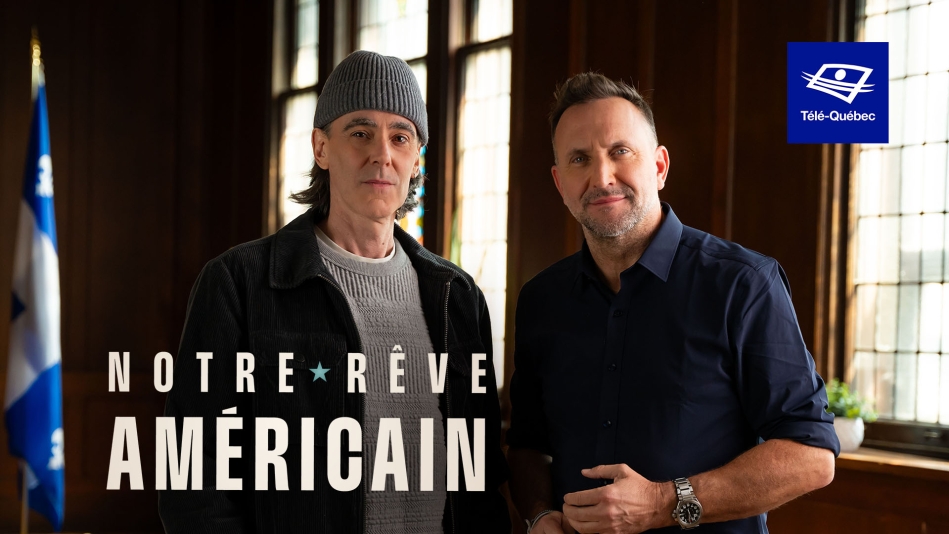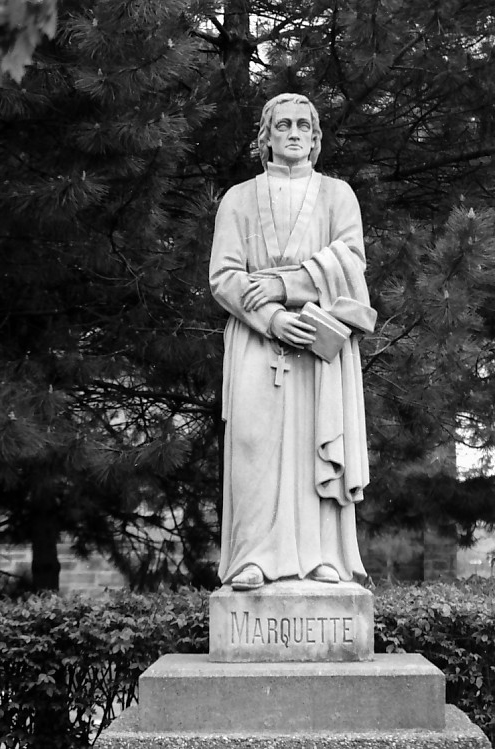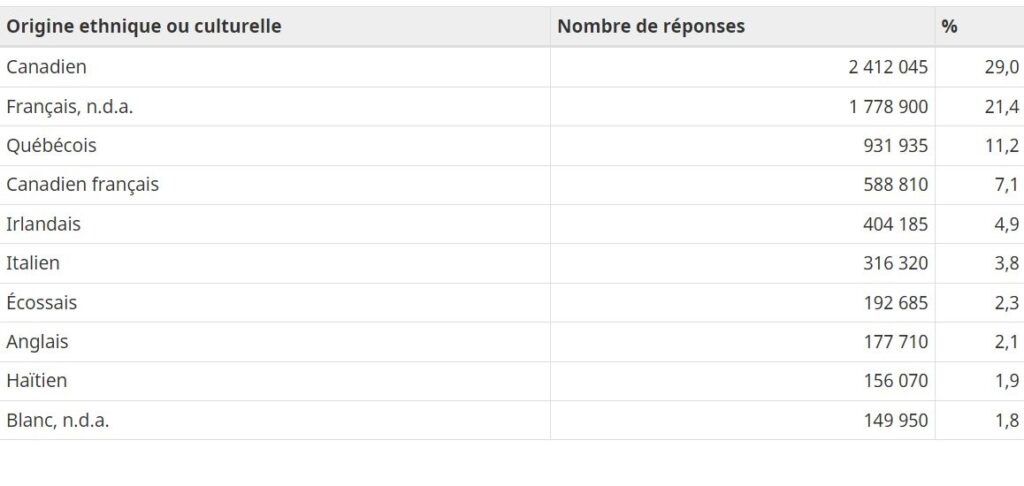In September, Télé-Québec aired Notre rêve américain, a documentary on French-Canadian heritage in the United States hosted by Jean-Michel Dufaux and Sébastien Fréchette, a.k.a. Biz. Documentaries on the Franco-American experience are uncommon on both sides of the border; in Quebec, the (fictional) miniseries Les Tisserands du pouvoir, which aired more than thirty years ago, still serves as reference material.
But Notre rêve américain stands out not only by virtue of the rarefied air it enjoys. From the 1870s onward, opinionmakers in Quebec often portrayed emigrants as traitors or as people driven abroad by their personal failings. As emigration largely ceased and neonationalism took root in Quebec, expressions of contempt morphed. Franco-American culture and life were, it seems, doomed—no match for the American melting pot. Every other year, from the 1960s onward, the press ran articles supposedly showing, once and for all, that death had come for Franco-America. “Dead ducks” was the regrettable phrase used by René Lévesque. This fit neatly with the sense that North American French culture could only be safe in Quebec and, for many, an independent Quebec. More recently, exchanges over social media have shown a knowledge gap. If there is contempt still, it no doubt stems from ignorance of the larger North American francophonie, which the school system in la belle province does little to address. Notre rêve américain helps fill that knowledge gap in a surprisingly positive way.
The flip side to simmering contempt is fascination captured in books like Volkswagen Blues and, more recently, Ils ont couru l’Amérique. There is enduring amazement at the geographical breadth of the French presence—beyond Quebec, beyond New England, beyond the Great Lakes, beyond the Prairies. It captures a romance of adventure, discovery, and conquest that seems impossibly removed from present-day Quebec and thus that tantalizes by its exoticism. It enables Quebeckers to feel as though they might not be a petite nation after all; they can believe that only a few little historical accidents ultimately relegated them to the “confinement” of the province they inhabit.

The documentary plays on this feeling by taking viewers to Detroit. As the story shifts to New England, in the second half, filmmakers must abandon the exoticism of the frontier; they nevertheless elicit compassion. They aim to understand Franco-American life on its own terms by appealing directly to Franco-Americans (living, breathing Franco-Americans). Their words are not instantly followed by editorial commentary focused on Quebec’s cultural challenges or the virtue of sovereignty (as we have seen elsewhere). The hosts explicitly acknowledge that Franco-American culture survives and has its own legitimacy in English. They paint a vivid picture: Quebec is the citadel of the North American francophonie, while French-heritage minorities elsewhere are deep in the trenches, fighting the real battle.
As someone who bathes in the subject, I was interested in the overall narrative more than in the finer historical data points. The creators’ and hosts’ empathetic narrative revolves, I found, around a common “we.” It invites Quebec viewers to include Franco-Americans from Detroit to Manchester and beyond in their collective identity—a generously capacious “we” that is not bounded by geography, but bound by common roots. It is, in a sense, a rediscovery of ethnicity on a continental scale.
The filmmakers’ proposed “we” raises questions that cannot be addressed in a fifty-minute documentary for a general audience—critical questions though they are. As generous as the “we” may be, it is also nebulous and it flirts with ahistoricity. Dufaux, for instance, claims that it is des Québécois who went to Michigan. He thus uses a term that didn’t become common currency until the twentieth century to designate people who lived a century or two earlier. He reads back in time an identity that wouldn’t have made sense to those historical figures.
While at a diner in Detroit, Biz asks rhetorically, Est-ce qu’on sait ce qu’on a fait? (Do we know what we have achieved?). Quebeckers would be prouder, he argues, if they knew of their achievements beyond the province’s borders. They are more than the losers of the Conquest, the Rebellions, and the referendums. He adds, On a fait des choses—notamment Détroit, ici on le voit bien, mais on connaît pas beaucoup nos victoires (We have accomplished things—notably Detroit, we see it here, but we know little of our triumphs). Here the broad “on” (“we”) is stretched over present-day Franco-Americans, but also over the achievements of French-heritage people going at least as far as the founding of Detroit in 1701—and earlier explorers like Jacques Marquette are presented in the same way in the film.

Later, Biz recounts Cadillac’s founding of Detroit, the founding of the Cadillac Automobile Company in Detroit, and the origin of the car’s iconic crest. He adds that it is the official car of the U.S. president. He concludes, Y a toujours un p’tit peu de nous autres là-dedans, tout le temps (There remains a little bit of us in that, all the time). The “us” appears to stretch over Cadillac, whose career began and ended in France, where his descendants lived, and who spent less than a decade in the St. Lawrence River valley. He served the French Crown and operated in circles beyond the reach of most French settlers, thanks in part to an invented claim of nobility. We might raise the same questions about the French-Canadianness of Marquette and many others who nevertheless have a place in a French-Canadian pantheon. (Note that some commentators highlight French achievements but create greater distance—fascination without association, if we will.)
Way back when, at Brock University, a recurring question ran through my graduate seminars: “Who is they?” Around the table, it was easy to lose track of subjects when discussing the intersection of different groups. Coherent and precise discussions required clarity and the “they” that we discussed always required a clear antecedent. Whenever ambiguity set in, one professor in particular would call us to order: “Who is they?” “We” suffers from the same problem and raises the same question.
This question is not a plea for static, permanent categories. Our “we” changes in the contexts of family, geography, work, politics, faith, and various other markers of identity and community. If there is a plea at all, it is a call to attention to the slipperiness and shifting nature of the ethnic “we” specifically (which seems to be the “we” that Biz calls forth). The history of Quebec in the last two hundred years attests to that ambiguity.[1]
This is not to say that there is no place at all for an ethnic “we.” Ethnicity is a useful category of analysis, even if it is not written into the natural order of things and even if it is constructed. Ethnicity also rests—in part—on a sense of shared memory, shared experiences. Biz’s remarks could be seen as intended to shore up a common identity, a shared community, precisely by reclaiming a past “that is ours.”

Innocent and well-intentioned though the remarks may be, I will admit to the discomfort of sharing a “we” with people who lived three hundred years ago, my direct ancestors included. Their identity and community eventually produced mine, but otherwise bear almost no similarity to them—minus, perhaps, the language. A diachronic “we” almost always entails a reading back in time of that which we are today. It also entails a claim of responsibility (or credit) that has always struck me as immodest, imprecise, and fundamentally inaccurate. We did not explore the Great Lakes and the Mississippi. If you and I and our contemporaries say otherwise, we claim achievements that may gratify our individual and collective egos—but we are also reveling in our team’s victories when we have warmed the bench the entire season.[2]
Beyond recognition of some inescapable ambiguity, this should serve as an invitation to scrutinize the “we” that sits at the intersection of history and ethnicity. How is it used? Who is defining the group? For what purpose? Who is intentionally brought in and intentionally left out? What identity does it serve? Would the people who are included actually define themselves (or have defined themselves) in the same way? What is accomplished in including you and me in a group of people who founded a Midwestern city?
Let us hold each other to account and, regardless of context, raise the critical question. Who is we—really?
[1] Even today, when politicians in Quebec use “we,” ambiguity results from an often-unspoken antecedent. Are they referring to all residents of the province, or francophones, or people of French-Canadian descent, or people who support a certain set of orthodox positions?
[2] On a personal level, I also confess some discomfort with a shared “we” that lives in the present day and that includes people from Baie-Comeau, Amos, Detroit, Fall River, and Edmundston, as some commentators (perhaps even Biz) would have it. On a large scale, it ceases to have meaning or explanatory value.
Perhaps “we” is then more reflective of those with whom an “I” feels connected?
Until your post, I had no awareness that Quebecois (in the now?) bore an animosity to cousins who settled outside of Quebec. Did I read that right? In the forays I’ve made in my life into Quebec, New Brunswick and Nova Scotia, I’ve always felt more “welcome home” than “what the hell are you doing here?” Another door to walk through and explore what’s inside.
The contempt was primarily elite discourse (newspapers, other publications, legislative debates) and its purpose was in part to deter people from going abroad, since there was justifiable concern about Quebec’s ability to sustain its population. It also stemmed from fear of the Anglo-Protestant melting pot. I have seen few studies of popular perceptions of emigration. Considering how many French Canadians did emigrate, the popular view was undoubtedly less hostile than priests’ and politicians’ but the topic deserves more study. Nowadays, my sense is that Quebeckers are happy to meet self-identifying Acadians and French Canadians from different regions of the continent, even though misunderstandings about their lived realities and culture remain.
It must be understood that until the ’60’s French-Canadian of all parts of Canada, New-England and the Midwest shared a connection, namely through relatives. Returning to Montreal from a field trip in Detroit as an engineering student in 1970, I was amazed to meet a gentleman on the train returning from visiting relatives in the Detroit area where I had seen the Ford “River Rouge” (not “Red River”) auto plant. Then again, in 1976 I met cousins of my mother from Providence RI. at a family reunion on Île d’Orléans. There was also, “mon oncle des états”, a cousin driving up from New England one summer to show off his new car and collect on bragging rights…These seemed anecdotal at the time to a teenager, mainly, I guess, because the Quebec independence project architects had drawn a perception curtain of sorts to create a sentiment of isolation and dreath ; we were isolated and threatened with disappearance if we didn’t secede, a possibility that suddenly seemed real with de Gaulle’s intervention who would be dead a few years latter….
As for the breath of the “we”, well, all these historical figureheads didn’t paddle through the continent all by themselves… they seldom moved without a couple of dozens of hired hands, as Lewis and Clark needed voyageurs recruited in the St-Louis area to find their way. It’s the Indian wife of one of the guys that official American history chosed to remember. So it goes. Before 1760, some if not many of these fur traders crisscrossing the continent made it often on a yearly basis to Montreal. To our young male ancestors living in the St-Laurent valley, a season or two “dans les pays d’en haut” was a rite of passage into adulthood, one might say. Voyageurs… Wasn’t a space shuttle named Voyager ? It seems that they were more honored in the US than in Quebec. Maybe more of a wall than a mere curtain…
Some years ago I was strucked by Philippe Marchand’s Ghost Empire and have never ceased searching since. More recently, I found a Saint Jean-Baptiste church turned into an art gallery in Chicago’s South Side, in the Netflick series Shameless (of all places), and then another, still very much active in the Eat Side of Manhattan. Amazing !
So, yes, “we”, because it’s part of our history, as much as Paul Revere is part of American history. It’s been hidden from us and we’re eager to rediscover it, as Jean-Michel Dufaux and Sébastien Fréchette were and are.